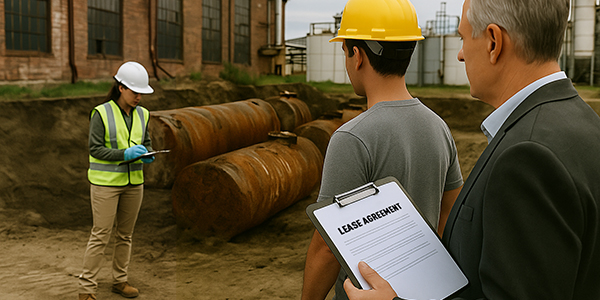
16 Jun Annual Environmental Inspections Protect Industrial Landlords
Reading Time: 3 minutesLandlords who lease to ISRA-subject tenants need do certain things to protect their properties and overall financial interests. Owning an industrial property in New Jersey comes with unique environmental compliance responsibilities. The New Jersey Department of Environmental Protection (NJDEP) enforces the Industrial Site Recovery Act (ISRA), a law that may mandate hazardous waste cleanup for industrial establishments subject to ISRA. (A quick refresher on ISRA basics is found here: TRIGGERED: The Industrial Site Recovery Act (ISRA). For property owners who lease space to industrial establishments, conducting annual inspections (or biannual, if a two-year cycle is deemed sufficient) is a proactive strategy to avoid triggering ISRA unexpectedly and prevent costly delays in property transactions or financing by ensuring that tenants meet leasehold environmental obligations. Here’s what you need to know to safeguard your investment.
The First Protective Step
The first step in protecting a developer’s interests is to retain the right legal counsel when negotiating the deal. Developers and landlords always have real estate attorneys at the ready to assist with leases or sales. However, that is not enough. It is imperative that you also consult an environmental attorney to ensure that your tenant and the agreement of sale or lease are fully protective of the developer’s interests. ESA has been involved in too many projects that have not gone well because the developer’s legal interests were not supported by environmental counsel.
So, let’s assume that you have proper legal representation during all stages of the deal. Why are annual inspections important?
Benefits of Annual Environmental Inspections
Verify Tenant Compliance with Lease Obligations
Leases for industrial properties typically include environmental provisions requiring tenants to handle hazardous substances responsibly and comply with NJDEP regulations. Annual inspections allow landlords to confirm that tenants are adhering to these terms. For example, inspections can identify improper storage of solvents, oils, or other hazardous materials, which could violate lease terms and potentially contribute to a future ISRA trigger. By identifying and addressing issues early, landlords can enforce compliance or require tenants to remediate problems, reducing the risk of liability.
Avoid Unexpected ISRA Triggers
ISRA is triggered by events like lease terminations, property sales, cessation of operations, or a tenant moving to a new location. Landlords may not know if a tenant’s operations have already initiated an investigation or if their activities, such as handling hazardous substances in quantities exceeding de minimis thresholds, require a Preliminary Assessment (PA) and Site Investigation (SI). Annual inspections help identify potential Areas of Concern (AOCs) such as storage tanks or floor drains. Doing so can mitigate potentially serious environmental impacts. This proactive approach also prevents surprises during transactions, when tenants cease operations, or relocate.
Minimize Delays in Property Transactions and NJDEP Compliance Obligations
Property sales or refinancing often depend on environmental due diligence. A Preliminary Assessment (PA) revealing contamination may necessitate further investigations, such as a Remedial Investigation (RI), that delay closing by months. Even with NJDEP mechanisms to maintain the Party Responsible for Completing Remediation (PRCR) until an RAO is issued, these processes can be costly and time-consuming, often delaying or terminating deals. Annual inspections mitigate these risks by identifying and addressing potential violations early, such as unreported spills or improper waste disposal. By hiring ESA to conduct an environmental audit inspection, landlords can confirm eligibility for the De Minimis Quantity Exemption, reducing compliance costs and NJDEP oversight. Proactive inspections ensure smoother transactions, minimizing delays and financial penalties.
Protect Property Value and Financing
Lenders often require environmental due diligence (either a Phase I Environmental Site Assessment or Preliminary Assessment) before approving financing. Undiscovered contamination or ongoing ISRA investigations can lower property values and lead to loan denials. Regular inspections ensure that any environmental issues are documented and addressed, maintaining the property’s marketability and appeal to lenders.
How to Prepare for Annual Environmental Inspections
Hire ESA as your Environmental Consultant. Engage an environmental consultant with experienced professionals knowledgeable in ISRA requirements. The nuances of NJDEP regulations demand more than a general housekeeping inspection. ESA Environmental Consultants consistently provide landlords with value-added insights to maintain industrial properties.
Maintain Detailed Record-Keeping. Require that tenants maintain detailed permanent records about their operations including a list of hazardous materials, how and where they store chemicals, the way they manufacture their products, and how they manage waste streams. If tenants leave without a manual of their operations, it leaves many questions and “unknowns” about how they conducted their operation.
Utilize Counsel to Enforce Lease Terms. Use inspection findings to hold tenants accountable for environmental obligations.
The Bottom Line
Annual inspections are a small investment with significant returns for industrial property owners in New Jersey. By first codifying how tenants shall conduct waste management on your property, you then have the means to verify tenant compliance. This then gives the landlord the ability to identify environmental issues early. Armed with this information, landlords can avoid costly delays in transactions, secure financing, and minimize NJDEP compliance burdens. In a state with stringent environmental regulations, staying proactive with ESA Environmental Consultants at your side protects your property’s value and your peace of mind. Questions? Ask ESA.



